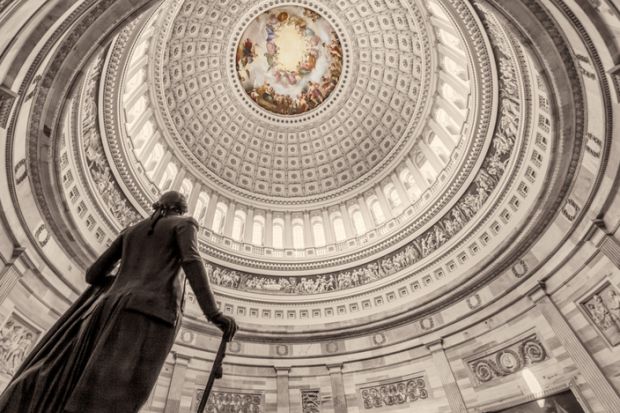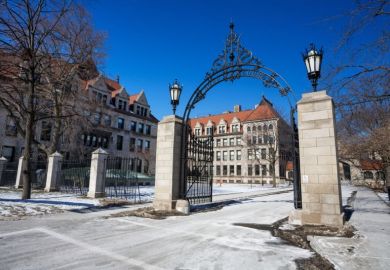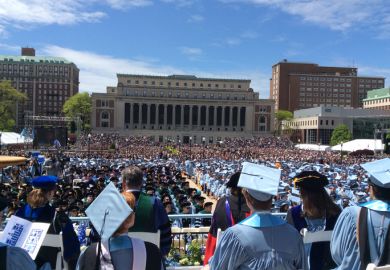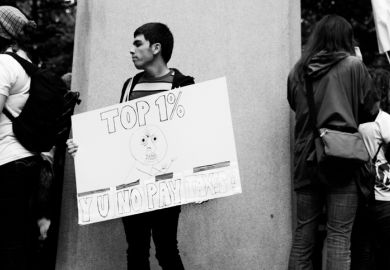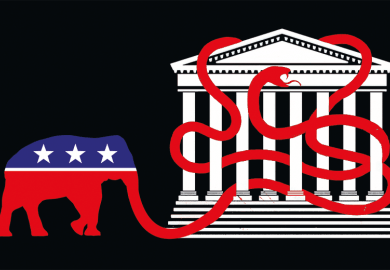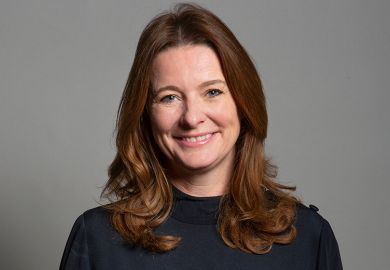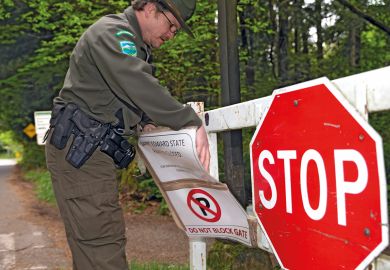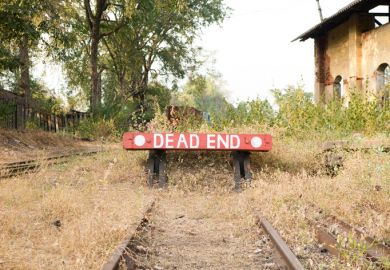The protests raging on college campuses across the US, and the responses by university and public officials, raise questions about the parameters of “ordered liberty”. This concept, coined by Supreme Court justice Benjamin Nathan Cardozo nearly a century ago, refers to the reality that even constitutionally protected freedoms must be bounded by law if social life is to be possible. In this case, the free expression rights of students protesting against Israel’s treatment of Palestinians run up against the core university functions of teaching, learning and research activities, as well as the physical safety of Jewish students.
The substantive questions about where to draw lines are complex, and they are accompanied by equally challenging questions about who gets to do the line-drawing in practice. Our answers define what sort of democracy we are and what sort of higher education system we have.
Many of the demands for the pro-Palestine camps to be erased have come from politicians who identify as conservative. And, sure enough, the conservative intellectual tradition has a lot to offer on the relationship between order and liberty. But it by no means straightforwardly supports calls to shut down the camps, particularly when those calls come from powerful officials in Washington.
To be clear, you don’t have to identify as conservative to draw valuable insights from conservative thought. The organisation I lead, Public Agenda, is dedicated to a democracy in which all voices are heard precisely because we believe that citizens and policymakers can – under the right circumstances – learn from each other, revise their views and make better decisions through public conversations.
Perhaps the quintessential conservative commitment is that institutions and organisations built over long periods, and through the work of many people, should not lightly be damaged or tossed aside. This view, articulated by the 18th-century politician and author Edmund Burke, is grounded in a recognition that most of what is good and worthwhile in the lives of individuals and communities comes not from laws imposed by governments but from the things they build together for themselves and each other – faith communities, civic associations, schools, museums, athletic clubs and more.
In the US, our colleges and universities have been built over centuries by diverse communities pursuing myriad aims: edification, moral and spiritual improvement, artistic excellence and economic advancement. They are not perfect, but they have been a key element of the country’s success over its history. When elected officials such as Republican congresswoman Elise Stefanik interfere in their operations in ways that increase tension and, in many cases, lead to chaos, they show a disregard both for the generations of Americans who have built our universities and for those in the present and future who stand to benefit from them.
Stefanik demanded that the Biden administration revoke Columbia University’s federal funding in response to its alleged failure to protect Jewish students. But such efforts to intimidate university presidents into taking actions that are not in the interests of their students or their institutions should be seen in the context of other efforts to damage colleges and universities, including educational gag orders passed by several Republican state legislatures and irresponsible claims, in the face of ample empirical evidence, that a college education no longer has value. The cavalier willingness to injure longstanding institutions in pursuit of short-term political gain is, from the conservative perspective, a most dangerous characteristic for a politician.
Another celebrated conservative, the Nobel Prize-winning economist Milton Friedman, argued that as more people work for or are regulated by government, officials will be tempted to use their power to intimidate and silence citizens and leaders of private organisations. And that, he believed, should give pause to all of us, even if we generally support the goals for which government power is expanded.
When Representative Virginia Foxx says Republican members of Congress are going to “take our universities back”, one can’t help but wonder what makes her think the nation’s universities – particularly its private universities – ever belonged to members of Congress. Witnessing Columbia president Minouche Shafik making real-time administrative decisions during a Congressional hearing that resembled a hazing ritual should send chills down the spine of anyone who believes in limited government.
Many conservative commentators have persuasively argued in recent years that universities have been too willing to restrict utterances – particularly those targeting identity groups – that they believe might harm others. The commentators contend that free expression should be protected even when the ideas expressed are deeply unpleasant, and university leaders have taken these arguments seriously. They have sought to recalibrate in the direction of greater free expression, while also taking positive steps to help students engage constructively with peers with whom they disagree.
Striking the right balance is challenging, especially in rapidly evolving situations where the facts themselves are in question. But while we should unequivocally condemn antisemitism, it is clear that politicians in Washington are not the right people to adjudicate on whether specific utterances made on campuses hundreds or thousands of miles away constitute legitimate expression or prohibited intimidation.
And when university leaders capitulate to political pressure and order coercive suppression of protest, we should be concerned not only about the denial of individual rights but also about the harm inflicted on institutions that have served our country well for centuries.
Andrew J. Seligsohn is a political scientist who serves as president of Public Agenda.
Register to continue
Why register?
- Registration is free and only takes a moment
- Once registered, you can read 3 articles a month
- Sign up for our newsletter
Subscribe
Or subscribe for unlimited access to:
- Unlimited access to news, views, insights & reviews
- Digital editions
- Digital access to THE’s university and college rankings analysis
Already registered or a current subscriber? Login
